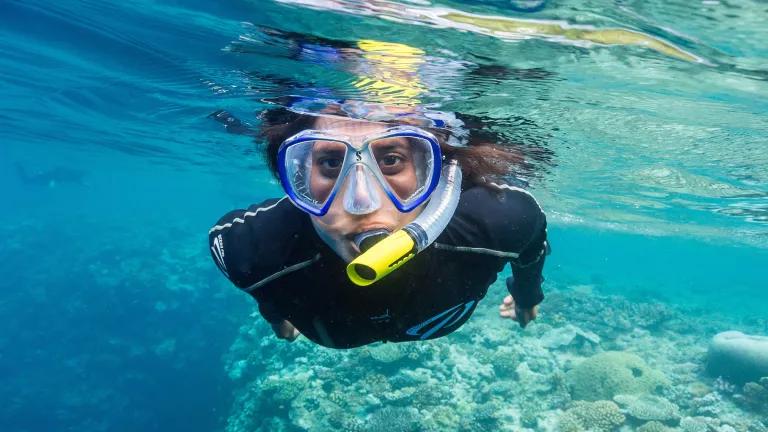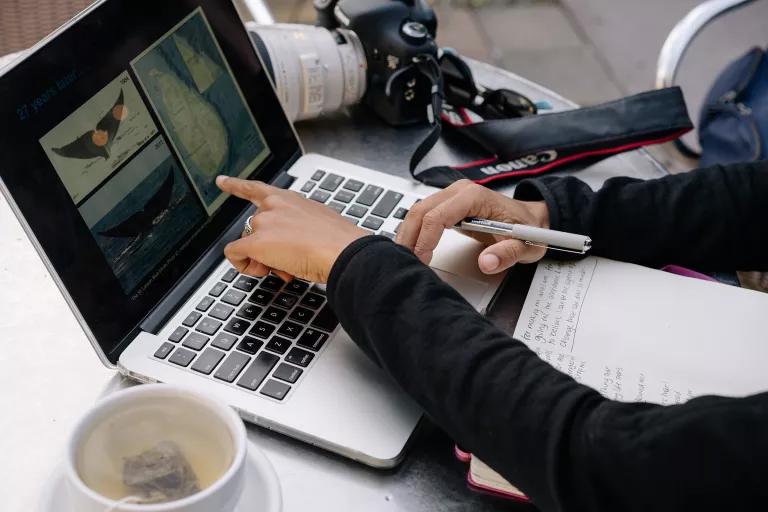Putting an End to “Colonial Science”
The scientific community is starting to confront internal biases that support social stratification, hinder international cooperation, and—sometimes—impair research.

Asha de Vos, marine biologist
Sri Lankan marine biologist Asha de Vos was a young graduate student when she made her first big scientific discovery back in 2003. From a research vessel in the northern Indian Ocean, just five degrees north of the equator, she encountered a population of blue whales that defied the conventional scientific wisdom that all whales of this species migrate thousands of miles each year to feed in cold waters before returning to warmer seas to breed. This particular group, de Vos observed, was highly unorthodox in its homebody-ness, preferring to feed and breed in the same area year-round.
No one had ever noticed this anomaly before. Energized by her find, de Vos envisioned a Sri Lankan–based research project dedicated to studying these whales. So she began reaching out to the international scientific community, looking for guidance and advice at the outset of what she knew would be a major endeavor. What de Vos got instead were multiple variations on a single theme: hearty congratulations from her fellow scientists on her discovery—followed by their offers to come to Sri Lanka and capitalize on that same discovery by conducting research of their own.
“I was initially taken aback and felt pretty insulted,” de Vos told me in a recent email exchange. “When you reach out to someone and ask for help to support a discovery you’ve made, and are told instead to get a research permit so that they can bring their teams—from outside your country—to conduct the research, you realize how imbalanced the system is.” The self-serving nature of the responses was obvious, but something bothered de Vos even more: the “uncomfortable assumption that people from my part of the world were seen as less capable of doing this kind of work.”
Undeterred, de Vos launched the Sri Lankan Blue Whale Project in 2008. The project was the first long-term study of this unique blue whale population; it would ultimately blossom into Oceanswell, a much larger marine science organization that de Vos leads, which blends research, education, and conservation advocacy focused on Sri Lanka and its surrounding waters. And after that initial experience opened her eyes to certain prejudices and power imbalances in the modern-day scientific establishment, de Vos became a vocal and high-profile critic of what she calls “parachute science,” or “colonial science.”
In an essay published in Scientific American last month, de Vos defined parachute science as “the conservation model where researchers from the developed world come to countries like mine, do research, and leave without any investment in human capacity or infrastructure.” In addition to her pioneering whale research and work with Oceanswell, she has spent the last several years sounding the alarm—in articles, interviews, and TED talks—on this troubling yet pervasive dynamic, which “creates a dependency on external expertise and cripples local conservation efforts,” in her words.

Increasingly, researchers from wealthy countries and elite institutions are coming to see the scientific and ethical importance of listening to—and learning from—local scientists and community members in the often-remote places that are central to their fields of study. The issue has led to a fair amount of institutional soul-searching. In 2018, the editors of the journal Lancet Global Health shared in an editorial that their publication, as a matter of course, “look[s] extremely unfavourably on papers submitted by authors who have done primary research in another country (particularly a low-income or middle-income country) but not included any author from that nation,” and went so far as to wrestle openly with the question of how to treat secondary data analysis that didn’t incorporate local scientific resources. Their editorial prompted a response in Quartz Africa from Moses John Bockarie, a Sierra Leonean medical researcher who wrote of the need to “close the door to parachute researchers and those who pursue a parasitic rather than symbiotic approach to research in and about Africa.”
Last September, representatives of the Global Microbiome Conservancy, an international consortium of scientists focusing on the relationship between gut microbes and disease, issued a statement acknowledging that its research “has mainly focused on populations living in urban areas of Europe and North America, creating a strong disparity in our knowledge of the human microbiome biased towards industrialised populations.” Noting that the fastest rates of growth for microbiome-related conditions—such as inflammatory bowel disease, autoimmune diseases, and diabetes—are occurring in nonindustrialized countries, the writers admitted that “[t]his knowledge imbalance will further exacerbate healthcare inequities,” adding that the therapeutic models derived from such circumscribed data sets “may not be efficacious worldwide.”
Members of the Global Microbiome Conservancy went even further by observing that “it is unethical to travel through a country to collect and remove samples if local scientists are left out of the picture and not involved in the project as co-investigators or collaborators.” The organization vowed to dramatically increase its efforts to collaborate with local experts at the research and publication levels. It ended its statement with a refreshingly candid promise: “Advertising research integrity and raising awareness about best ethical scientific practices is easy. Doing them in practice is more difficult. Anticipating and preventing unethical action is even more complicated. We must remain humble. We probably don’t do all things right, but we strongly commit to trying our best.”
If the scientific establishment is evolving in this direction, de Vos says, then “it’s about time. After all, business as usual has not worked, so we need to be courageous if we truly want to drive change and shift the current trajectory.” Lately, she has moved beyond speaking and writing about the issue to actively building and testing new collaborative models and consulting with research funding agencies and NGOs to help them bring in new minds and voices. At each step of the way, de Vos has found that engaging with others who—like herself—have had brushes with parachute science “allows them to emerge, feel empowered, and also feel more heard. This is fundamental to resolving a systemic issue like this.”
As is the case with any scientific endeavor, an openness to new ideas and the willingness to abandon preconceptions are key. “The more we talk about this issue, the more we push for it to be discussed at all levels—in academia, in the funding space, in research and conservation—the more change we can create.” Redressing these imbalances is not only the right and fair thing to do, but it will also strengthen our scientific collaborations—and help deepen humanity’s understanding of the world we share.
This NRDC.org story is available for online republication by news media outlets or nonprofits under these conditions: The writer(s) must be credited with a byline; you must note prominently that the story was originally published by NRDC.org and link to the original; the story cannot be edited (beyond simple things such as grammar); you can’t resell the story in any form or grant republishing rights to other outlets; you can’t republish our material wholesale or automatically—you need to select stories individually; you can’t republish the photos or graphics on our site without specific permission; you should drop us a note to let us know when you’ve used one of our stories.


Air Pollution: Everything You Need to Know
What Are the Effects of Climate Change?
COP27: The Issues, the Tensions, and the Urgent Need for Unity on Climate